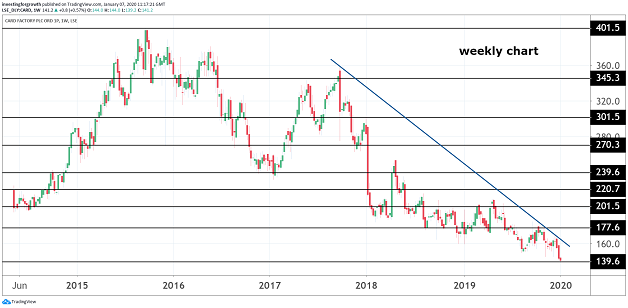Stockwatch: An all-time price low and 9.6% dividend yield
With a key trading update just days away, our companies analyst is tempted by this UK stock.
7th January 2020 11:31
by Edmond Jackson from interactive investor
With a key trading update just days away, our companies analyst is tempted by this UK stock.

At 140p, shares in Card Factory (LSE:CARD), Britain’s leading retailer of cards and gifts, are at an all-time share price low ahead of Thursday’s trading statement for the four weeks to 24 December. This, despite historically strong free cashflow that’s enabled the board to return £344 million or 101p per share since its shares floated at 225p in May 2014. Capable new directors with fresh marketing initiatives is promising development too.
It’s as if investors reckon cards retail is in terminal decline, left to older generations as youngsters communicate by smartphone and postage costs creep up. Yet, we saw last year how a few retailers, like Pets at Home (LSE:PETS) and Dunelm (LSE:DNLM), defied gloomy sentiment, their stocks rebounding. So, might £490 million Card Factory be at an inflection point, share price wise, if Thursday’s statement isn’t dire?
Emphasis is on the trading narrative
I examined the stock 18 months ago as a potential addition at 199p, asking the question “attractive 8.5% yield or value trap?”. I concluded, cautiously, that the shares might be a potential buy lower down, given profit and cash flow had fallen at the operating level despite a 6% rise in interim revenue.
A steadily falling, albeit jagged, chart suggests plenty of investors have caught a falling knife, while book value of around 65p – that’s comprised 145% by intangibles and involves around £320 million (mostly long-term) debt and lease liabilities - puts the emphasis on every trading update.
On 14 November, and in respect of the nine months to end-October, management said it expected full-year profits (to 31 January) broadly in line with its previous expectations.
Cynics might say “broadly” means shortfall creeping in, as higher-than-average spend in stores was compromised by lower footfall (in a challenging high street environment).
The update was structured to show off group revenue growth of 5%, helped by 12 net new stores in the UK and Ireland over the August to October period, in context of 38 net new stores for the nine-month period. Management said it was on track to deliver around 50 stores for 2019 as a whole. The website achieved 21.9% revenue growth over nine months, down on a strong 2018 period performance of 70.9% albeit from a low base anyway.
Vague parallels with the Mirror newspaper group
The figures/narrative were mixed, however, in the sense that like-for-like store sales eased 0.4% in the August to October quarter, possibly maintaining fears among investors that card sales are in steady fundamental decline. Mind, the same was said of newspapers and, in particular, The Mirror, and yet shares in Trinity Mirror (re-named Reach Group (LSE:RCH)) have proved an excellent recovery play.
Not to draw too close a parallel as the rating did get very cheap there, versus cashflow rapidly cutting debt, although there’s some overlap in the sense of a mature cash generative business finding new growth angles. Will results flow and the stock market similarly wake up here?
Questions in recent cashflow dynamics, for dividends
Although Card Factory is unexciting for current growth prospects, its stock now yields 6.6% historically, or nearer 9.6% on a 12 months forward basis if consensus for a total 13.2p a share in dividends in respect of the current year is fair, then 13.5p for 2020/21.
A 2.9p interim dividend and 5p special dividend – totalling £27 million – were paid out last 19 December, although, looking at the interim results, end-July cash was £4.8 million and the trend in operational cash flow had seen a like-for-like fall from £52.3 million to £26.4 million. Some £30 million of proceeds from bank borrowings could be seen as helping pay £20.1 million lease liabilities and/or £21.9 million dividends.
That’s not to dismiss Card Factory’s overall strong cash generative profile, but either its recent dynamics need to adjust better or I can’t see this extent of special dividends continuing (prudently) unless trading improves.
So, I’d assume only a 9.3p ordinary dividend being maintained, which still offers a supportive 6.6% yield at 140p a share. The prospective price/earnings (PE) ratio is 8.3x consensus earnings per share (EPS) of 17.3p for the current year ending, an 8% fall on 2018/19 with interim underlying EPS having shown a 6% slip.

Source: TradingView Past performance is not a guide to future performance
Management changes convey capable leadership
While the current CEO has been in place nearly three years, there have been other board changes that comprise quite a refreshing at the top. Our basic criterion is whether management can at least run a worthwhile business than one in terminal decline (the market is pricing the stock for).
They seem capable enough: Australian Karen Hubbard was poached from B&M European Value Retail (LSE:BME) four years ago where she was chief operating officer, having previously been with Asda and earlier BP's (LSE:BP.) retail operations in Australia. A new chairman, formerly chief executive of Britvic (LSE:BVIC) which has proved a Stockwatch winner in the last two years, was appointed just over a year ago. Also last August a new chief commercial officer arrived after 14 years with Tesco, most recently as category director for home, seasonal and design. His mission is to “improve the range and quality of both card and gift/dressings options and grow our market-leading position.”
| Card Factory - financial summary | ||||||
|---|---|---|---|---|---|---|
| year ended 31 Jan | 2014 | 2015 | 2016 | 2017 | 2018 | 2019 |
| Turnover (£ million) | 327 | 353 | 382 | 398 | 422 | 436 |
| Operating profit (£m) | 71.0 | 56.6 | 88.9 | 85.7 | 75.5 | 76.9 |
| Operating margin (%) | 21.7 | 16.0 | 23.3 | 21.5 | 17.9 | 17.6 |
| Net profit (£m) | 18.4 | 33.2 | 66.4 | 65.7 | 58.3 | 52.7 |
| IFRS3 earnings/share (p) | 5.4 | 10.6 | 19.5 | 19.3 | 17.1 | 15.4 |
| Normalised earnings/share (p) | 5.5 | 19.5 | 19.5 | 20.1 | 17.7 | 18.7 |
| Earnings/share growth (%) | 42.9 | 253 | 0.2 | 3.2 | -12.2 | 6.1 |
| Price/earnings multiple (x) | 7.7 | |||||
| Operating cashflow/share (p) | 19.7 | 24.1 | 23.2 | 24.0 | 21.3 | 37.6 |
| Capex/share (p) | 3.5 | 3.2 | 3.4 | 3.1 | 3.8 | 3.5 |
| Free cashflow/share (p) | 16.1 | 20.9 | 19.8 | 20.9 | 17.5 | 34.1 |
| Dividends per share (p) | 6.8 | 8.5 | 9.1 | 9.3 | 9.3 | |
| Yield (%) | 6.5 | |||||
| Covered by earnings (x) | 1.6 | 2.3 | 2.1 | 1.8 | 1.7 | |
| Net debt (£m) | 347 | 101 | 123 | 135 | 161 | 291 |
| Net assets per share (p) | 9.1 | 83.0 | 78.0 | 73.2 | 64.0 | 64.4 |
| Net tangible assets per share (p) | ||||||
| Source: historic Company REFS and company accounts |
New retailer agreements increase penetration in the UK and abroad
An initial 12-store trial with Aldi was extended to over 130 stores with no sign of cannibalising Card Factory’s existing stores; hence, it was agreed under a one-year rolling contract to expand this to 440 stores – half the Aldi UK estate – by end-November 2019.
I’d expect this to mitigate the risk of disappointment in the upcoming Christmas trading statement, given Aldi has just reported record trading up 7.9% to over £1 billion in the same four-week period to 24 December. Branded concessions are also being trialled in 15 Matalan stores in a range of locations.
- UK share tips: Six ‘value’ stocks for 2020
- Want to invest ethically? ii’s ACE 30 list of ethical investments can help
After a seven-month trial in Australia, a five-year exclusive partnership has been agreed with its largest greetings cards retailer, The Reject Shop, starting this year. Card Factory will replace the stores’ existing provider, supplying all 360. That a “marked” increase in sales resulted during the trial bodes well.
Obviously, more evidence is needed to see where the balance lies between such new initiatives and possible steady attrition of the main UK customer base if greetings cards are losing appeal. But in terms of testing the stock with a small trading position, we also must bear in mind the odds of a warning on Thursday.
Invesco selling could have meant some overhang
The largest shareholder, Invesco (NYSE:IVZ), has lately been trimming its stake – from 25.8% last September to 21.9% as of 16 December – although other institutions have added recently.
Possibly Invesco was in two minds as to long-term prospects, hence from a risk management perspective it would seem wise to reduce an over-weight stance which was a quite risky position, even for a sub-£500 million stock.
I can’t say whether demographic change means that, on a 10-year view, demand for greeting cards is sustainable, but for perhaps the next two years Card Factory looks to have a decent chance of wresting growth.
Key issues are manifest enough now to judge if a small “tester” position is worth taking. I believe it is, even before the update. Manage it thereafter according to news and results. Buy.
Edmond Jackson is a freelance contributor and not a direct employee of interactive investor.
These articles are provided for information purposes only. Occasionally, an opinion about whether to buy or sell a specific investment may be provided by third parties. The content is not intended to be a personal recommendation to buy or sell any financial instrument or product, or to adopt any investment strategy as it is not provided based on an assessment of your investing knowledge and experience, your financial situation or your investment objectives. The value of your investments, and the income derived from them, may go down as well as up. You may not get back all the money that you invest. The investments referred to in this article may not be suitable for all investors, and if in doubt, an investor should seek advice from a qualified investment adviser.
Full performance can be found on the company or index summary page on the interactive investor website. Simply click on the company's or index name highlighted in the article.
Disclosure
We use a combination of fundamental and technical analysis in forming our view as to the valuation and prospects of an investment. Where relevant we have set out those particular matters we think are important in the above article, but further detail can be found here.
Please note that our article on this investment should not be considered to be a regular publication.
Details of all recommendations issued by ii during the previous 12-month period can be found here.
ii adheres to a strict code of conduct. Contributors may hold shares or have other interests in companies included in these portfolios, which could create a conflict of interests. Contributors intending to write about any financial instruments in which they have an interest are required to disclose such interest to ii and in the article itself. ii will at all times consider whether such interest impairs the objectivity of the recommendation.
In addition, individuals involved in the production of investment articles are subject to a personal account dealing restriction, which prevents them from placing a transaction in the specified instrument(s) for a period before and for five working days after such publication. This is to avoid personal interests conflicting with the interests of the recipients of those investment articles.